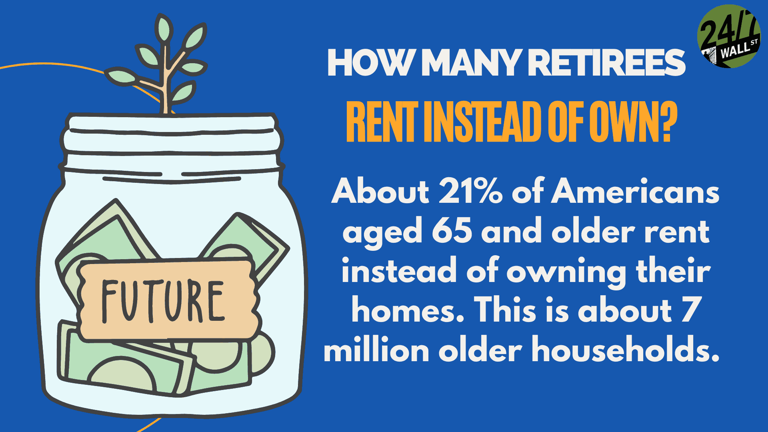
Should we sell our paid-off home and downsize? My wife says yes, but I’m not so sure
Older couples often face the dilemma of what to do with their larger homes once their children have moved out.
Today, let's look at a hypothetical scenario and how to potentially approach this common financial crossroad.
Meet Lisa and Mark, a couple in their mid-50s who are preparing to retire within the next few years. They’ve done a great job building a solid retirement portfolio, but they’re facing a dilemma about their living situation. Lisa wants to sell their paid-off 4,000 square-foot home (now that their two kids are off to college), which has appreciated significantly, and downsize to a smaller apartment. Her idea is to bank the proceeds, invest them, and enjoy the extra cash by retiring sooner and traveling more.
On the other hand, Mark is resistant to the idea of selling their home. He believes that renting is never smart, and he’s concerned about giving up a fully paid-off asset in favor of renting something smaller. He feels more secure staying in a home they own outright, even if it means delaying retirement a bit longer.

Let’s break down the pros and cons of both perspectives and see how they can approach this decision.
Key Points from 24/7 Wall St.
- If you haven't compared your auto insurance to the market's current rates, you might be overpaying!
- Learn how one guy went from "way behind" to "ahead of schedule" when it comes to retirement
- Don't leave your idle cash in a checking account that pays you zero interest. See how switching to a high-yield savings account can earn you hundreds, if not thousands, per year.
1. The Case for Selling and Renting (Lisa’s Perspective)

Lisa sees selling their large home as an opportunity to unlock the wealth tied up in the property and gain more flexibility in their retirement years. Here are the key reasons why she feels strongly about downsizing and renting:
Unlocking Home Equity:
Their home has appreciated significantly, and selling it would free up a large chunk of money (even after taxes and realtor fees). This could be invested in their retirement portfolio, generating additional income. With interest rates on savings and investments currently higher than mortgage rates in many cases, Lisa sees an opportunity to grow their wealth by investing the proceeds.
Retiring Sooner:
By selling the home and using the proceeds, they could likely retire sooner without needing to rely solely on their savings and investments. The lump sum from the sale would provide more financial flexibility, potentially allowing them to spend more in retirement on travel and experiences.
More Freedom and Flexibility:
Lisa also wants more flexibility. Renting a smaller apartment means they won’t have to worry about maintenance, repairs, property taxes, or other homeownership-related expenses. They could move around more easily, live in different cities for short periods, or travel without the burden of a large home to manage.
Right-Sizing Their Living Space:
Their 4,000-square-foot home is more than they need now that the kids have moved out. Lisa feels they could downsize to a much smaller place that’s easier to manage and still comfortable. By doing so, they’d reduce utility costs and upkeep, freeing up more money for the things they enjoy.
2. The Case for Staying and Owning (Mark’s Perspective)
Mark is more conservative in his approach. He feels strongly that owning is always better than renting, especially when the home is paid off. Here’s why he prefers to stay in their current home:
Home Ownership Is Security:
Mark sees their paid-off home as a stable asset that provides financial security. Without a mortgage, they don’t have to worry about rising rents, landlord issues, or being forced to move. Staying in the home means they always have a place to live without the uncertainty that comes with renting.
Appreciation Potential:
The home has appreciated greatly over the years, and Mark believes it could continue to rise in value. Selling now would mean they might miss out on future appreciation. He also believes owning real estate is a better long-term investment than renting.
Emotional Attachment:
Mark has an emotional attachment to the home. It’s where they raised their kids, and it holds sentimental value. Moving into a smaller rental apartment might feel like a step down in comfort and lifestyle, which could be hard for him to adjust to.
Renting Feels Risky:
Mark is worried that renting could lead to unexpected increases in costs over time, as rental prices rise, particularly in competitive markets. With ownership, they know exactly what they’ll need for maintenance and taxes, whereas rent can change at any time.
3. Financial Considerations for Both Sides
While both perspectives have valid points, Lisa and Mark need to carefully weigh the financial impact of their decision. Here’s what they should consider:How Much Would They Get from Selling?
They should start by getting a real estate agent to assess how much their home is worth and calculate the net proceeds after selling costs (such as agent commissions, closing costs, etc.). Once they know how much they’ll walk away with, they can determine how much they can invest and how much income that could generate.
Cost of Renting vs. Staying:
They also need to compare the costs of renting a smaller apartment versus staying in their home. For renting, this includes rent payments, utilities, and potential cost increases over time. For staying, they should consider the ongoing costs of property taxes, maintenance, repairs, and utilities for a large home.
Investment Returns:
Lisa’s idea to invest the proceeds from selling the house is a valid consideration. If they invest the proceeds in a diversified portfolio, they could generate returns over time that might outpace the appreciation of their home. This could provide them with additional income to fund their retirement lifestyle.
4. Compromise: What If They Split the Difference?
There may be a compromise that satisfies both Lisa and Mark. For example, they could consider:
Renting for a Trial Period:
Instead of immediately selling their home, Lisa and Mark could rent it out for a year or two while they rent an apartment themselves. This way, they can see how they feel about living in a smaller space and whether they miss owning their home. At the same time, they could still be earning income from renting out their home, which might help offset the cost of their apartment.
Downsize to a Smaller Owned Property:
Another option is to sell their current home but buy a smaller home or condo instead of renting. This way, they still own a property and maintain some of the security Mark values, but they free up equity to enjoy more flexibility and additional retirement income.
Big Decisions
The decision to downsize, rent, or stay in their home carries long-term consequences for their retirement. That’s why it could be a smart idea for Lisa and Mark to work with a financial planner who can help them evaluate all the variables. A financial advisor can run different scenarios based on their current assets, projected investment returns, and lifestyle goals to help them understand which option makes the most financial sense.
4. Compromise: What If They Split the Difference?
There may be a compromise that satisfies both Lisa and Mark. For example, they could consider:
Renting for a Trial Period:
Instead of immediately selling their home, Lisa and Mark could rent it out for a year or two while they rent an apartment themselves. This way, they can see how they feel about living in a smaller space and whether they miss owning their home. At the same time, they could still be earning income from renting out their home, which might help offset the cost of their apartment.
Downsize to a Smaller Owned Property:
Another option is to sell their current home but buy a smaller home or condo instead of renting. This way, they still own a property and maintain some of the security Mark values, but they free up equity to enjoy more flexibility and additional retirement income.
Big Decisions
The decision to downsize, rent, or stay in their home carries long-term consequences for their retirement. That’s why it could be a smart idea for Lisa and Mark to work with a financial planner who can help them evaluate all the variables. A financial advisor can run different scenarios based on their current assets, projected investment returns, and lifestyle goals to help them understand which option makes the most financial sense.
A planner can also address other considerations, such as how the sale of the home might impact their taxes, the best way to invest the proceeds, and how much income they’ll need in retirement to cover their desired lifestyle.
Lisa and Mark are both coming from reasonable perspectives, but their decision will ultimately come down to balancing financial goals with personal preferences. Downsizing and renting could provide them with more flexibility, cash to enjoy retirement sooner, and reduced maintenance responsibilities. On the other hand, staying in their paid-off home offers security and potential future appreciation.
By carefully weighing the financial impact and seeking professional guidance, they can make a decision that allows them to live the retirement they both envision—whether it’s staying in their family home or embarking on new adventures with more financial freedom.
It’s Your Money, Your Future—Own It (sponsor)
Retirement can be daunting, but it doesn’t need to be.
Imagine having an expert in your corner to help you with your financial goals. Someone to help you determine if you’re ahead, behind, or right on track. With SmartAsset, that’s not just a dream—it’s reality. This free tool connects you with pre-screened financial advisors who work in your best interests. It’s quick, it’s easy, so take the leap today and start planning smarter!
Don’t waste another minute; get started right here and help your retirement dreams become a retirement reality.
